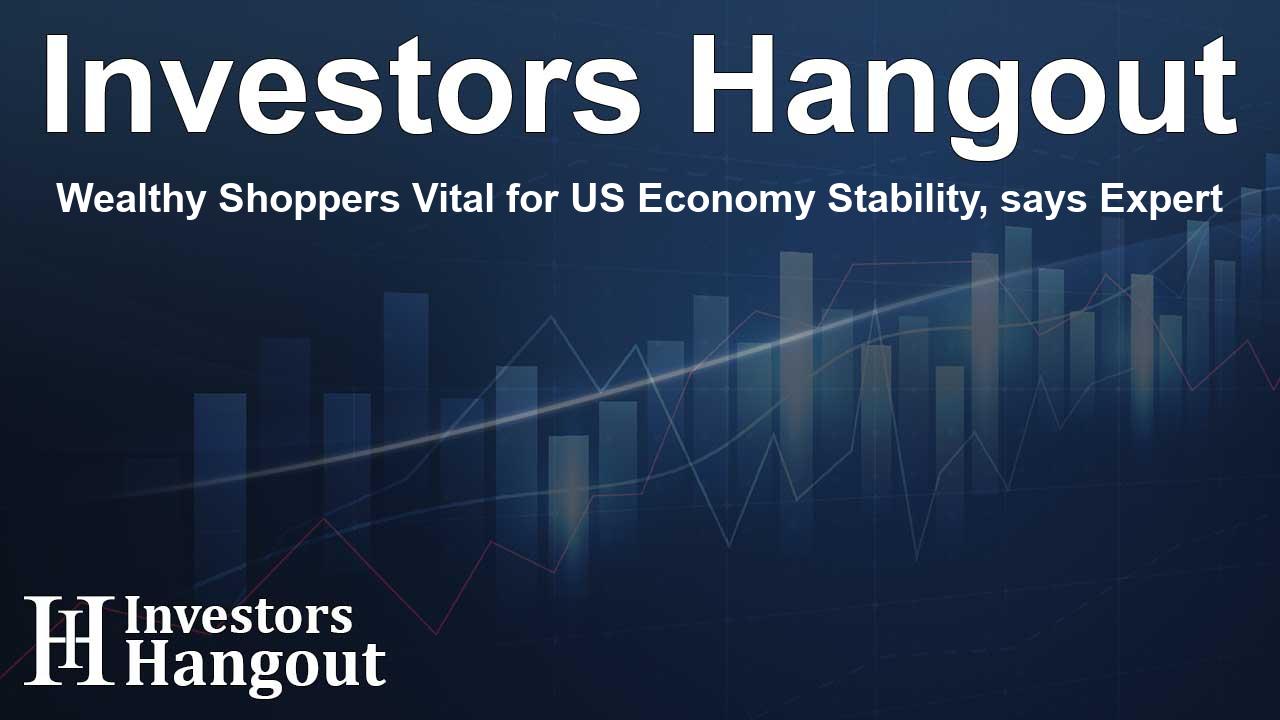Wealthy Shoppers Vital for US Economy Stability, says Expert

The Importance of Wealthy Consumers in the US Economy
Mark Zandi, the chief economist at Moody's Analytics, has emphasized the critical role that affluent individuals play in supporting the U.S. economy. According to him, their spending habits significantly influence the overall economic landscape.
Spending Trends Among High-Income Households
Recently, Zandi pointed out that the spending of the top 20% of U.S. households has consistently outpaced inflation since the onset of the pandemic. This trend is particularly pronounced among the top 3.3% of income earners, which has raised concerns regarding economic stability.
The economist warns that a reduction in spending from these wealthy households could result in serious repercussions for the economy. As long as this group continues to spend freely, there appears to be less risk of a recession on the horizon.
The Impact of Wealthy Consumers' Caution
Zandi highlights, "The data illustrate that the U.S. economy is largely sustained by well-off consumers. If they adopt a more cautious approach, whether due to economic uncertainty or other factors, it could create significant challenges for the economy." His insights suggest that continued robust spending by these households is essential to prevent economic downturns.
Economic Forecast and Risks
In addition to his observations about consumer spending, Zandi recently voiced his concerns over a high probability of a recession in the near future, suggesting a 48% risk within the next year. This alarming forecast is driven partly by increasing income inequality, as evidenced by data from numerous financial institutions.
Income Inequality and Its Economic Consequences
Further insights from economic analysts reveal a widening financial gap within the U.S. economy. Higher-income households are not only spending more but also experiencing substantial wage growth, contrasting sharply with lower-income groups, who are increasingly feeling economically marginalized.
Financial leaders like Jamie Dimon, the CEO of JPMorgan Chase, have voiced similar concerns regarding income disparity. Dimon underscores the necessity of fostering economic growth that benefits everyone, indicating that the current economic structure disproportionately favors the wealthiest while neglecting lower-income consumers.
The Role of Major ETFs in Investment Strategies
In the context of market performance, notable financial instruments like the SPDR S&P 500 ETF Trust (SPY) and the Invesco QQQ Trust ETF (QQQ) have demonstrated impressive gains recently, climbing by 12.9% and 15.66% respectively. This surge reflects the broader market trends and investor confidence in segments driven by high-income consumers.
With these trends in mind, investors are closely monitoring the actions and spending habits of affluent households, as they play a pivotal role in shaping market realities and economic forecasts.
Conclusion: The Path Forward for Economic Stability
Looking ahead, the trajectory of the U.S. economy seems heavily dependent on the willingness of wealthy consumers to continue their high levels of spending. Policymakers and business leaders must take these dynamics into account to navigate any impending economic challenges effectively.
Frequently Asked Questions
What role do wealthy consumers play in the US economy?
Wealthy consumers significantly drive economic growth through their spending, which accounts for a substantial portion of overall economic activity.
What are the current spending trends among high-income households?
High-income households have been spending more than the rate of inflation, particularly post-pandemic, which contrasts with lower-income households experiencing financial strain.
What risk of recession is currently predicted?
Experts, including Mark Zandi, suggest there is a 48% probability of a recession occurring in the next year, largely influenced by consumer spending patterns.
Who else has commented on income inequality?
Jamie Dimon, CEO of JPMorgan Chase, has publicly discussed income inequality and the necessity to create a more inclusive economic environment that benefits all demographics.
How are major ETFs performing?
Major ETFs like SPY and QQQ have shown strong performance with significant percentage gains, reflecting investor confidence in sectors influenced by wealthy consumers.
About The Author
Contact Evelyn Baker privately here. Or send an email with ATTN: Evelyn Baker as the subject to contact@investorshangout.com.
About Investors Hangout
Investors Hangout is a leading online stock forum for financial discussion and learning, offering a wide range of free tools and resources. It draws in traders of all levels, who exchange market knowledge, investigate trading tactics, and keep an eye on industry developments in real time. Featuring financial articles, stock message boards, quotes, charts, company profiles, and live news updates. Through cooperative learning and a wealth of informational resources, it helps users from novices creating their first portfolios to experts honing their techniques. Join Investors Hangout today: https://investorshangout.com/
The content of this article is based on factual, publicly available information and does not represent legal, financial, or investment advice. Investors Hangout does not offer financial advice, and the author is not a licensed financial advisor. Consult a qualified advisor before making any financial or investment decisions based on this article. This article should not be considered advice to purchase, sell, or hold any securities or other investments. If any of the material provided here is inaccurate, please contact us for corrections.
